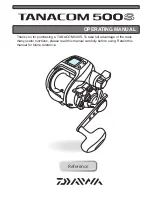
B-5
according to the transmitter manufacturer
and d is the recommended separation
distance in metres(m). Field strengths
from fixed RF transmitters, as determined
by an electromagnetic site survey,
a
should be less than the compliance level
in each frequency range
b
Interference may occur in the vicinity of
equipment marked with the following
symbol:
NOTE 1 At 80 MHz and 800 MHz, the higher frequency range applies.
NOTE 2 These guidelines may not apply in all situations. Electromagnetic propagation is
affected by absorption and reflection from structures, objects and people.
a
The ISM (industrial, scientific and medical) bands between 0,15 MHz and 80 MHz are
6,765 MHz to 6,795 MHz; 13,553 MHz to 13,567 MHz; 26,957 MHz to 27,283 MHz; and
40,66 MHz to 40,70 MHz. The amateur radio bands between 0,15 MHz and 80 MHz are
1,8 MHz to 2,0 MHz, 3,5 MHz to 4,0 MHz, 5,3 MHz to 5,4 MHz, 7 MHz to 7,3 MHz,
10,1 MHz to 10,15 MHz, 14 MHz to 14,2 MHz, 18,07 MHz to 18,17 MHz, 21,0 MHz to
21,4 MHz, 24,89 MHz to 24,99 MHz, 28,0 MHz to 29,7 MHz and 50,0 MHz to 54,0
MHz.
b The compliance levels in the ISM frequency bands between 150 kHz and 80 MHz and
in the frequency range 80 MHz to 2,7 GHz are intended to decrease the likelihood that
mobile/portable communications equipment could cause interference if it is inadvertently
brought into patient areas. For this reason, an additional factor of 10/3 has been
incorporated into the formulae used in calculating the recommended separation distance
for transmitters in these frequency ranges.
c Field strengths from fixed transmitters, such as base stations for radio (cellular/cordless)
telephones and land mobile radios, amateur radio, AM and FM radio broadcast and TV
broadcast cannot be predicted theoretically with accuracy. To assess the electromagnetic
environment due to fixed RF transmitters, an electromagnetic site survey should be
considered. If the measured field strength in the location in whichThe model ECG
recorder is used exceeds the applicable RF compliance level above, The model ECG
recordershould be observed to verify normal operation. If abnormal performance is
observed, additional measures may be necessary, such as re-orienting or relocating The




































